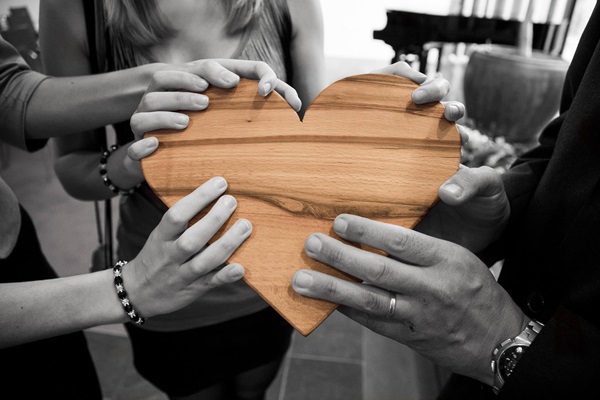Hay muchas veces en las que una lesión es más soportable que la cirugía necesaria para curarla. El racismo está en esa categoría.
|
Todo esto proviene de Dios, quien por medio de Cristo nos reconcilió consigo mismo y nos dio el ministerio de la reconciliación. [2 Corintios 5:18, NVI] |
La labor de la reconciliación racial es un proceso doloroso y difícil. Después de haber experimentado muchos retrocesos al trabajar en la reconciliación racial en congregaciones locales, mi superior me preguntó si yo podía continuar levantando el problema del racismo y trabajar en la reconciliación pero sin causar tanto dolor. Mi respuesta fue: es imposible. Cuando un mal está profundamente implantado en nosotros, es imposible extirparlo sin causar dolor.
Considere el trabajo de un cirujano que encuentra un problema dentro del cuerpo un paciente y que debe conducir una cirugía para reparar con cuidado el daño interno. El doctor tiene que hacer una incisión para tener acceso al interior del paciente. La incisión causará dolor y demandará tiempo de recuperación. El camino a la sanidad es doloroso. Lo mismo ocurre con la reconciliación racial. Sanar las heridas del racismo es difícil y doloroso. Debemos abandonar la ilusión de que se puede lograr sin experimentar dolor. Uno debe dar ciertos pasos para transitar por el dolor, lo cual nos llevará a sanar la comunidad.
El reconocer que el proceso será doloroso no significa que debamos tratar de causar más dolor que el necesario. Lo que hacemos es revelar cuál es la enfermedad ya presente para después aplicar un proceso de sanidad que a menudo requiere algunas “cirugías” y “dolor” necesarios para sanar. Esa es la labor de la reconciliación racial.
La primera tarea de la reconciliación racial es definir apropiadamente qué es y qué no es la reconciliación. A veces escucho que la gente usa el término “reconciliación” en formas que me dan rabia. “Debemos orar por reconciliación”, dice el pastor de una iglesia grande de gente blanca y rica. A la iglesia asisten muchos líderes políticos y comunales. Para ellos la reconciliación es algo acerca de lo cual sólo oran; algo que no les requiere trabajo y algo que sólo dios puede arreglar: "Kumbaya, Señor, Kumbaya”.
Otros buscan la reconciliación porque sólo quieren que los oprimidos los perdonen. Esto permite que los beneficiarios de la injusticia racial no tengan nada que confesar, nada que cambiar, nada que pagar o conceder. Para ellos, la reconciliación significa negar las injusticias del pasado, incluso se ocurrieron cinco minutos atrás, y las injusticias del presente. No se intenta corregir ninguna injusticia. Allan Boesak y Curtiss DeYoung[1] la llaman “reconciliación falsa”. En suma, esta reconciliación falsa busca acomodar la injusticia y la opresión. Jamás aborda el problema de la injusticia y los ataques a la humanidad y dignidad de aquellos que sufren la injusticia. No tengo ningún interés en participar en esto.

La iglesia y todos nosotros debemos buscar una reconciliación que aborde la raíz de la injusticia y que ponga un nuevo fundamento que produzca comunidad. Por tanto, en mi trabajo como presidente de la Comisión de Religión y Raza de la Conferencia Georgia Norte, he definido la reconciliación racial como un proceso espiritual y político que busca restaurar las relaciones quebrantadas después de cualquier forma de injusticia racial. No es un solo acto. Es un proceso por el cual quienes participan en la injusticia y aquellos que la sufren se juntan para trabajar juntos en la meta de restaurar su relación con Dios y unos con otros.
El proceso incluye al menos lo siguiente:
- Resistencia – esto significa que aquellos que sufren injusticia y aquellos que los apoyan se mantienen firmes en resistir los poderes de la injusticia y toda forma de opresión que se opone al reino de Dios. Para los oprimidos, la resistencia es negarse a tolerar la injusticia.
- Reconocimiento – indica que aquellos que han participado en perpetuar la injusticia reconocen dicha injusticia y el hecho de que son cómplices en ella.
- Arrepentimiento (y perdón) – los participantes de la injusticia se arrepienten ante Dios y se arrepienten ante quienes han sufrido la injusticia, a la vez que los sufrientes trabajan en perdonar.
- Reparación (y/o reembolsar, reemplazar, restituir) – esto quiere decir que aquellos que participaron en la injusticia deben trabajar para reparar el daño que hicieron, pagar lo que se perdió, reemplazar lo que fue tomado y restituir el daño cometido.
- Reconstrucción – no podrá haber una verdadera reconciliación si las estructuras no cambian. Se debe edificar una nueva estructura que desmantele la estructura de poder para reconstruir una nueva estructura justa y equitativa.
- Restauración de relaciones – se restauran y fortalecen las relaciones de una manera que (a) demuestra el compromiso para jamás permitir que la injusticia vuelva a aparecer y (b) que permite que las relaciones sean evaluadas constantemente por medio de examinar el proceso de reconciliación.
Si el proceso de reconciliación se termina, la injusticia regresará y la reconciliación será un fracaso. La reconciliación deberá buscarse siempre en una relación de trabajo. Por tanto, la meta no es la justicia, sino que la justicia es un medio para llegar a la meta. La meta es crear comunidad. Cuando usamos la palabra “reconciliación” nos referimos a esto. La reconciliación no es algo para lo cual nos tomamos de la mano y oramos a Dios que la lleve a cabo. No hay espacio aquí para el Kumbaya. La reconciliación es el trabajo que Dios nos ha mandado realizar. Pido en oración que todos se nos unan en este trabajo de reconciliación.

El Rvdo. Brian A. Tillman preside la Comisión de Religión y Raza de la Conferencia Georgia Norte, y también es pastor asociado de la IMU Ben Hill, en Atlanta. Con frecuencia usa la etiqueta #ResistToReconcile
[1] Boesak, A. A., & DeYoung, C. P. (2012). Radical Reconciliation: Beyond Political Pietism and Christian Quietism. MaryKnoll, NY: Orbis Books.



